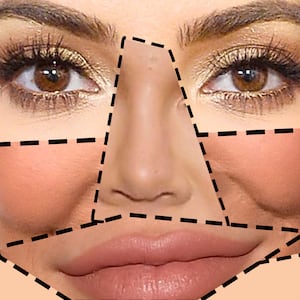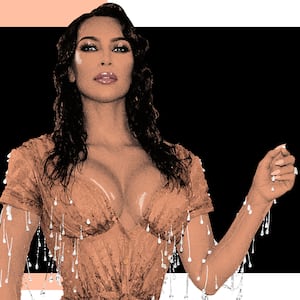In light of the Kardashian-Jenner clan officially signing off from their long-running E! reality series Keeping Up with The Kardashians this week, it’s been hard to find new, revelatory ways to contextualize their footprint on society, considering that their status as some of the world’s most influential figures is constantly under a microscope.
At this point, we can pretty much all agree that the Kardashians’ quest for fame has been successful, no matter how many scandals, magazine covers, nude photoshoots, clothing lines, and even books it took for them to get there. Likewise, their reality-TV retirement (although they recently signed a multi-year deal with Hulu and Disney Star, so who knows) has mostly been interpreted as a triumph and sign of a job well done.
But looking back at the 15 years that KUWTK has been on the air, it’s interesting to think about what the show failed to do for the family’s public personas. While the program was able to boost the profiles of its stars, from the previous background player Kylie Jenner to the show’s former villain Scott Disick, it still struggled to change public attitudes about the moguls and their respective scandals, despite their attempts to portray them in a sympathetic light.
Co-produced by the family’s matriarch and diligent momager Kris Jenner since its beginning and, later on, by Kim, Kourtney and Khloe, KUWTK—plus its many later spin-offs—was not only a platform for endless exposure, but also an opportunity to control public narratives and engage with unflattering tabloid stories. From Kim denying any involvement in the leaking of her sex tape, to getting an X-ray of her butt to prove that she didn’t have implants, to taking dance classes after she was kicked off a stage by Prince, the Kardashians painted a portrait of themselves as charming newbies to fame who didn’t take themselves seriously and sometimes were even in on the joke.
But as the headlines about the family became less frivolous and more rooted in legitimate social problems like racism, unhealthy body image, electoral politics and, most unexpectedly, flouting COVID-19 safety precautions, with social media constantly ready to discuss these topics, the Kardashians struggled to manipulate or even engage in these scandals in a way that worked to their benefit.
In the early 2010s, scrutiny over the Kardashians’ and Jenners’ relationship to Black culture and Black aesthetics was brewing online, with pictures of Kylie Jenner in cornrows and the sisters’ romantic relationships with mostly Black men serving as lightning rods for early internet discussions about cultural appropriation. But unlike those micro-scandals, the family couldn’t brush off the amount of disdain associated with them when in 2017, Pepsi dropped one of the most controversial commercials in pop culture history: Kendall Jenner offering a riot cop a can of the refreshing beverage at a mock protest.
The irreverent ad, which was clearly an attempt to profit off of the publicity of the Black Lives Matter movement, was upsetting and offensive to many online users, including Martin Luther King Jr.’s youngest daughter Bernice King, before becoming endless meme fodder.
Jenner waited to acknowledge the incident on the program’s 14th season in lieu of releasing an immediate apology. Despite all the time, her apology—or explanation rather—lacked substance and any understanding of why the commercial was offensive in the first place. Instead, she emphasized that her intention was never to offend anyone and spent most of the episode sulking about what the scandal meant for her career. Of course, Jenner’s career carried on smoothly, but the internet quickly flipped on the previously scandal-free member of the family.
Maybe the most striking example of the Kardashians’ built-in PR machine no longer serving them was when Khloe Kardashian’s boyfriend—and NBA player—Tristan Thompson had his second cheating scandal in 2019, this time involving Kylie Jenner’s best friend Jordyn Woods. The sisters had been able to weaponize their fan bases and popularity against less famous women they’ve had issues with in the past, such as Amber Rose and Blac Chyna, and settle these beefs on their terms. But Woods had access to an even more beloved family than the Kardashians: the Smiths, whom she’s known since childhood. Woods was thus able to use Jada Pinkett-Smith’s famous Facebook Watch talk show Red Table Talk to explain her side of the story and express remorse for the seemingly minimal role she played in the incident with Thompson.
Rather than allow Thompson to be the obvious villain in the scenario, Khloe made the mistake of attacking Woods on Twitter and blaming her for the dissolution of her family. At this point, Khloe, whose self-proclaimed fetish for Black men had long been a point of contention with Black Twitter, had burned too many bridges, unleashing a multi-day dragging session that continued even after she apologized for her tweet.
The KUWTK episode that captures this incident somehow feels more dramatic and emotionally raw than the episode detailing the aftermath of Kim’s Paris robbery. We watch Khloe go from numb to angry to sad trying to digest the news. There’s a scene of Kris Jenner telling her over the phone that she knew about the Woods interview and wasn’t able to stop it. The storyline ends with Khloe talking to Kim, the family’s apparent backlash whisperer, about the comments she’s received online and how cruel the internet can be, instead of doubling down on her apology and leaning into the criticism.
Part of the problem with the way KUWTK handled its biggest controversies is that the show rarely described the accusations leveled against them accurately or with specificity, a tactic that may have worked before social media and before they reached mega-fame. Situations are often vaguely labeled as “negative” and framed as misunderstandings rather than leaning into the larger, real-world implications of their actions. So much of the underlying commentary during the Jordyn Woods fiasco had to do with misogynoir, slut-shaming, and the stars’ treatment of Black women versus their treatment of Black men—weighty topics that the family just didn’t have the vocabulary to engage in.
While KUWTK will always be an interesting document that captured a family’s arduous journey to global success, it never truly accomplished what good reality television following a fixed set of characters over a long period is supposed to do: display a level of personal growth. The family will forever owe a lot to the series, but the series could never save the troublesome reality stars from themselves.



